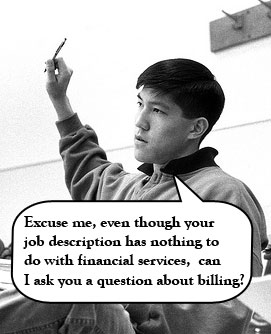UC Davis College of Engineering/flickr

Online learning students often don’t know where to turn when they have questions, so they end up directing them to their online teachers — whether we teachers are qualified to answer them or not. As a result, I have had students ask me each of the following 8 inappropriate questions in my five years as an online teacher. Editor’s Note: Online students, read on to learn if you’ve been asking the wrong questions of your teachers, and to learn more about the netiquette of corresponding with your online instructors.
What NOT to Ask your Online Teacher:
1. Don’t ask… why a certain textbook is or isn’t used in your course.
In most online learning programs, the content is standardized to meet the objectives of the university. Teachers are not responsible for textbook selection, course content, or course grading rubrics. If you have specific text recommendations, you can indicate those suggestions on your end-of-course survey – these comments will be read from someone in academic affairs, the people who make textbook decisions.
2. Don’t ask your teacher… to violate university policy.
Course policy is set by the university. Most online teachers are adjunct faculty. This means they are contracted to teach one course at a time. Their motivation is often two-fold: they enjoy interacting with online students and they also appreciate the secondary income that comes from facilitating courses. Instructors shouldn’t be asked to risk those opportunities by violating their contracts. Students who have a concern with university policy should check with their adviser for the name of whom to contact in administration.
3. Don’t ask… “how am I doing in this course?”
Most online courses have grade books where students can access their grades for specific assignments as well as for overall course grades. Before contacting your teacher with questions about your grade, visit the online grade book to see your status.
4. Don’t ask… for suggestions about changing your major.
In most situations, online teachers are asked by administrators not to provide advice related to academic programming. If you’re highly interested in the course content – interested enough even to consider changing your major – make an appointment to talk with your academic adviser.
5. Don’t ask… for information related to financial aid or billing.
Online teachers are similar to on-campus instructors in that they serve a defined role. Instructors are experts in their subject field, but online instructors, like residential faculty, have very little, if any, knowledge of the financial aspects of your university program. Questions related to financial aid or billing should be directed to the financial aid or financial services office at your university. This office may also be known as the bursar.
6. Don’t ask… for professional advice.
Online instructors have been contracted to provide a service: course facilitation. While they may have the ability – and often the professional credentials – to give good advice, counseling and advice giving isn’t the nature of your relationship with them. If you’re taking an online course in psychology, a question about a particular psychiatric condition may be fine, but if you’re looking for assessment, diagnosis and treatment recommendations, you should seek out a mental health professional.
7. Don’t ask your online teacher… to tell you which job(s) best suits you
Many online instructors work full-time in their respective fields – often in a position of leadership. While they are a great source of practical information on course subject matter, they are not trained to assess your vocational skills and abilities. Seek the services of a career counselor if you need vocational assessment or career advice.
8. Don’t ask your online teachers… to give you a glowing reference
This can be difficult for online students. Employers and graduate school programs alike often ask for references from college professors. Keep in mind that your online teachers are not able to comment on much of what is commonly asked for on these recommendation forms because of the nature of online education. Many online faculty will complete these forms when asked, (I have on numerous occasions), but you’ll need to understand the limitations of online learning in terms of instructors being able to comment on your overall performance. You might be better off asking for a reference from your employer.
About the Author: Andrew Graham is the husband of 1 and father of 6. Graham is also a licensed professional counselor and assistant professor.
